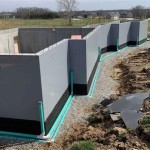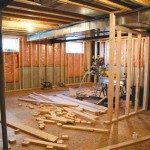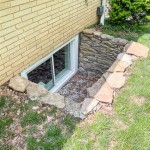Basement Air Conditioner and Dehumidifier
If you're like many homeowners, you may not think much about your basement until it's too late. This often-overlooked space can become a breeding ground for musty odors, mold, and mildew if not properly ventilated and dehumidified. That's where a basement air conditioner and dehumidifier come in. These appliances work together to create a more comfortable and healthy environment in your basement, while also protecting your belongings from damage.
Basement air conditioners cool and dehumidify the air, removing excess moisture that can lead to mold and mildew growth. Dehumidifiers work by drawing moisture from the air and collecting it in a reservoir, which must be emptied periodically. Both appliances are relatively easy to install and operate, making them a great option for homeowners who want to improve the air quality in their basement.
Benefits of a Basement Air Conditioner and Dehumidifier
There are many benefits to installing a basement air conditioner and dehumidifier. These include:
- Improved air quality: Basement air conditioners and dehumidifiers remove excess moisture from the air, which helps to reduce the growth of mold and mildew. This can improve the air quality in your basement, making it more comfortable and healthier to breathe.
- Reduced risk of damage: Mold and mildew can damage your belongings, including furniture, clothing, and electronics. A basement air conditioner and dehumidifier can help to protect your belongings from damage by reducing the growth of these harmful fungi.
- Increased comfort: A basement air conditioner can make your basement more comfortable to spend time in, especially during hot and humid weather. A dehumidifier can also help to reduce the feeling of dampness and mustiness in your basement.
How to Choose a Basement Air Conditioner and Dehumidifier
When choosing a basement air conditioner and dehumidifier, there are a few things you need to consider:
- The size of your basement: The size of your basement will determine the size of the air conditioner and dehumidifier you need. A smaller basement will require a smaller unit, while a larger basement will require a larger unit.
- The climate in your area: If you live in a humid climate, you will need a more powerful dehumidifier than someone who lives in a dry climate. You may also need a more powerful air conditioner if you live in a hot climate.
- Your budget: Basement air conditioners and dehumidifiers can range in price from a few hundred dollars to several thousand dollars. It's important to set a budget before you start shopping so that you don't overspend.
How to Install a Basement Air Conditioner and Dehumidifier
Basement air conditioners and dehumidifiers are relatively easy to install. However, it's important to follow the manufacturer's instructions carefully to ensure that the units are installed properly.
Here are the basic steps for installing a basement air conditioner and dehumidifier:
- Choose a location for the air conditioner and dehumidifier. The air conditioner should be placed in a window or through a wall, while the dehumidifier can be placed anywhere in the basement.
- Install the air conditioner according to the manufacturer's instructions. This will typically involve mounting the unit in the window or wall and connecting the electrical cord.
- Install the dehumidifier according to the manufacturer's instructions. This will typically involve connecting the electrical cord and turning on the unit.
- Test the air conditioner and dehumidifier to make sure they are working properly.
Maintenance of Basement Air Conditioner and Dehumidifier
Basement air conditioners and dehumidifiers require regular maintenance to keep them running efficiently. This includes:
- Cleaning the air filter: The air filter in your air conditioner should be cleaned every month or two, especially during the summer months when the unit is running more frequently.
- Emptying the dehumidifier reservoir: The dehumidifier reservoir should be emptied when it is full. This will typically need to be done every few days, especially during humid weather.
- Checking the refrigerant levels: The refrigerant levels in your air conditioner should be checked every year by a qualified technician.
Conclusion
A basement air conditioner and dehumidifier can make your basement more comfortable, healthy, and protected from damage. By choosing the right units and following the manufacturer's instructions for installation and maintenance, you can enjoy the benefits of these appliances for many years to come.

Installing Whole House Dehumidifier The Right Way Pv Heating

Do I Need A Dehumidifier For My Basement

5 Best Options For Cooling Your Basement

5 Best Options For Cooling Your Basement

Basement Odors How A Whole House Dehumidifier Makes Difference

What Is A Best Dehumidifier For Basement Aloraircrawlspace

What Factors To Consider When Choosing The Capacity Of A Dehumidifier

Faqs About Basement Air Conditioning

Basement Air Conditioner Solutions Skyhold Construction

Your Best Options For Cooling A Finished Basement Berico
See Also








